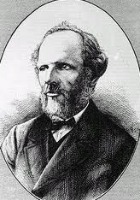Charles Heavysege
Charles Heavysege Poems
Open, my heart, thy ruddy valves;
It is thy master calls;
Let me go down, and, curious, trace
Thy labyrinthine halls.
...
The day was lingering in the pale north-
west,
And night was hanging o'er my head-
Night, where a myriad stars were spread;
...
Childhood alone is glad. With it time flees
In constant mimes and bright festivities.
It, like the ever-restless butterfly,
...
Hushed in a calm beyond mine utterance,
See in the western sky the evening spread;
Suspended in its pale, serene expanse,
...
What ails me? what impels me on, until
The big drops fall from off my brow? Whence comes
This strange affliction?--Oh, thus to the driven
...
The Jewish king now walks at large and sound,
Yet of our emissary Malzah hear we nothing:
Go now, sweet spirit, and, if need be, seek
...
Now let me die, for I indeed was slain
With my three sons. Where are ye, sons? Oh let me
Find ye, that I may perish with you; dying,
...
'Tis solemn darkness; the sublime of shade;
Night, by no stars nor rising moon relieved;
The awful blank of nothingness arrayed,
...
WHO is lord of lordly fate,--
Lady of her lot's estate?
He who rules himself is he,
She who tempts not fate is she.
...
See how the Morn awakes. Along the sky
Proceeds she with her pale, increasing light,
And, from the depths of the dim canopy,
...
How great unto the living seem the dead!
How sacred, solemn; how heroic grown;
How vast and vague, as they obscurely tread
...
'Twas on a day, and in high, radiant heaven,
An angel lay beside a lake reclined,
Against whose shores the rolling waves were driven,
...
'Twas Sabbath morn. I lay 'neath pensive spell,
And saw, in reverie or waking dream,
My life elapse, in likeness of a stream
...
The stars are glittering in the frosty sky,
Frequent as pebbles on a broad sea-coast;
And o'er the vault the cloud-like galaxy
...
All's over here;--let us withdraw and weep
Down in the red recesses of our hearts,
Or, in our spirits, silent, curse the cravens
...
Charles Heavysege Biography
Charles Heavysege (May 2, 1816 – July 14, 1876) was a Canadian poet and dramatist. "He was one of the first serious poets to emerge in Canada, and his play Saul was hailed on its appearance as the greatest verse drama in English since the time of Shakespeare." Born in Huddersfield, Yorkshire, England, Heavysege emigrated to Montreal in 1853 where he worked as a wood carver. In 1860 he became a reporter for the Montreal Transcript, and later for the Montreal Daily Witness, where he eventually became city editor. As a poet, Heavysege was mainly influenced by John Milton" Shakespeare" and the Bible." His first published work was The revolt of Tartarus, a poem in six parts, published in two editions: one under his own name in London in 1852, and a second, heavily edited and published anonymously in Montreal, in 1855. He published Sonnets in 1855, Saul: a drama in three parts in 1857, Count Filippo; or, the unequal marriage in 1860, The Owl (an imitation of Poe's "The Raven") and The Huntsman in 1864, The Advocate (a prose work) and Jephthah’s daughter in 1865, and Jezebel in 1867. During his lifetime, Saul was Heavysege's best-known work. Nathaniel Hawthorne passed on a copy to the North British Review, where it was given a laudatory (unsigned) review by Coventry Patmore, who called it "indubitably the best poem ever written out of Great Britain." That was followed by further favorable reviews in the Atlantic Monthly, Galaxy, and New York Evening Post. Saul was published in two further editions, in 1859 (also in Montreal) and 1869 (in Boston). (The Boston edition was reprinted in 1876 and again in 1967.) Other admirers of Saul were Canadian Prime Minister Sir John A. Macdonald and American poet Henry Wadsworth Longfellow. Highly regarded in the 1860s and 1870s, Heavysege "was one of the first of the Anglo-Canadian poets to achieve international recognition; he paved the way for later poets such as Charles Sangster Charles G.D Roberts" W.D. Lighthall, who included Heavysege's work in his 1889 anthology Songs of the Great Dominion, wrote of him: "His work is in no sense distinctively Canadian. Canadians do not read him; but they claim him as perhaps their greatest, most original writer, if they could weigh him aright and appreciate him; and he will probably always command their awe, and refuse to be forgotten." However, his reputation declined in later decades: "In the nationalist 1920's critics disparaged Heavysege's poetry on the grounds that he was not really a Canadian writer, although he continued to be read by poets like W.W.E. Ross, Ralph Gustafson, and A.J.M. Smith.... Today his crude but vigorous poetry is underrated by Canadian criticism." In 1956, while dismissing Saul and Count Filippo as "Victorian dinosaurs," Canadian literary critic Northrop Frye acknowledged Heavysege as the "first poet who really came to grips with" what Frye considered to be "the central Canadian tragic theme" (that being "the indifference of nature to human values"): "His third poem, Jephthah's Daughter, seems to me to reflect more directly the influence of his Canadian environment, as its main themes are loneliness, the indifference of nature, and the conception of God as a force of nature." Saul was produced as a radio drama by the Canadian Broadcasting Corporation in 1974.)
The Best Poem Of Charles Heavysege
Secrets Of The Heart
Open, my heart, thy ruddy valves;
It is thy master calls;
Let me go down, and, curious, trace
Thy labyrinthine halls.
Open, O heart, and let me view
The secrets of thy den;
Myself unto myself now show
With introspective ken.
Expose thyself, thou covered nest
Of passions, and be seen;
Stir up thy brood, that in unrest
Are ever piping keen.
Ah! what a motley multitude,
Magnanimous and mean!
